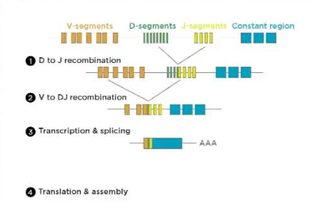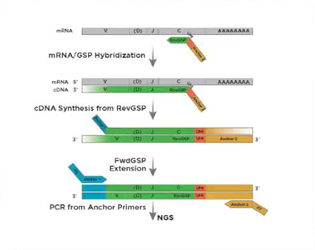Research Article
Unlocking The Secrets of Immune Responses: Adaptive Immune Receptor Repertoire Profiling
Masters by Research Gaiasce company and Gss subsidiary, Haymarket Street, Manchester, Lancashire, United Kingdom.
*Corresponding Author: Solomon I. Ubani,Masters by Research Gaiasce company and Gss subsidiary, Haymarket Street, Manchester, Lancashire, United Kingdom.
Citation: Solomon I. Ubani. (2024). Unlocking the Secrets of Immune Responses: Adaptive Immune Receptor Repertoire Profiling. International Journal of Medical Case Reports and Reviews, BioRes Scientia Publishers. 3(5):1-3. DOI: 10.59657/2837-8172.brs.24.059
Copyright: © 2024 Solomon I. Ubani, this is an open-access article distributed under the terms of the Creative Commons Attribution License, which permits unrestricted use, distribution, and reproduction in any medium, provided the original author and source are credited.
Received: May 02, 2024 | Accepted: June 18, 2024 | Published: August 17, 2024
Abstract
The human body is a remarkable fortress, equipped with an intricate network of specialized cells and molecules that collectively form the immune system. This multifaceted defense mechanism is tasked with safeguarding our well-being by identifying and neutralizing a vast array of potential threats, ranging from viruses and bacteria to abnormal cells that could potentially lead to cancer. At the heart of this intricate system lie the adaptive immune cells, including T cells and B cells, each bearing unique receptors capable of recognizing and responding to specific antigens – the molecular signatures of invading pathogens or aberrant cells. These receptors, known as T-cell receptors (TCRs) and B-cell receptors (BCRs), are the keys that unlock the immune system's ability to mount a targeted and effective response.
Keywords: immune; response; adaptive; receptor; profiling
Introduction
In the ever-evolving landscape of medical research, understanding the intricate workings of the immune system has become paramount. From battling cancer to unravelling the mysteries of autoimmune disorders and infectious diseases like COVID-19, decoding the immune response holds the key to ground-breaking discoveries. Among the powerful analytical tools at our disposal, Adaptive Immune Receptor (AIR) Repertoire Profiling has emerged as a game-changer, offering researchers an unprecedented glimpse into the complex symphony of immune cells.
Figure 1: Immune receptor repertoire profiling effect for disease research in many areas including cancer cell.
Methods
Unveiling the Repertoire: AIR Profiling
Adaptive Immune Receptor Repertoire Profiling is a cutting-edge technique that allows researchers to comprehensively characterize the diverse array of TCRs and BCRs present within a given immune cell population. By sequencing and analyzing the genetic information encoding these receptors, scientists can gain invaluable insights into the immune system's response to various challenges, including
Cancer Research
In the battle against cancer, AIR profiling has emerged as a powerful ally. By studying the TCR and BCR repertoires of tumor-infiltrating lymphocytes (TILs), researchers can unravel the immune system's recognition and response patterns to specific tumor antigens. This knowledge paves the way for the development of targeted immunotherapies and personalized treatment strategies tailored to each patient's unique immune profile.
Figure 2: Driver Map Repertoire profiling assay showed characterization of immune cell samples
Autoimmunity and Transplantation
Autoimmune disorders, such as rheumatoid arthritis and type 1 diabetes, result from the immune system's misguided attack on healthy tissues. By analyzing the AIR repertoire of autoreactive T and B cells, researchers can identify the specific receptors involved in these aberrant responses, facilitating the development of targeted therapies and improving our understanding of autoimmune mechanisms.
Figure 3: TCR and BCR coding sequence arranged via a process known as V(D)J recombination
In the realm of organ and cell transplantation, AIR profiling offers invaluable insights into graft rejection and tolerance. By monitoring the recipient's immune repertoire before and after transplantation, researchers can pinpoint the receptors involved in graft recognition and develop strategies to modulate the immune response, increasing the chances of successful transplantation outcomes.
Infectious Diseases and Vaccine Development
The ongoing battle against infectious pathogens, such as the SARS-CoV-2 virus responsible for COVID-19, has underscored the importance of understanding the immune system's response. AIR profiling allows researchers to study the TCR and BCR repertoires of individuals exposed to or vaccinated against specific pathogens, shedding light on the immune mechanisms underlying protective immunity and informing the development of more effective vaccines and therapeutic interventions.
Results and Discussion
Advancing Immune Monitoring and Personalized Medicine
Beyond its applications in specific disease areas, AIR profiling holds immense potential for advancing immune monitoring and personalized medicine. By establishing comprehensive immune repertoire databases, researchers can gain a deeper understanding of the vast diversity of TCRs and BCRs present in healthy individuals, as well as the variations associated with different disease states.
This knowledge can pave the way for the development of powerful diagnostic tools capable of detecting immune dysregulation or the presence of disease-specific immune signatures, enabling earlier intervention and more targeted treatment strategies. Additionally, by monitoring an individual's immune repertoire over time, clinicians can track the effectiveness of therapeutic interventions and tailor treatment regimens accordingly, ushering in a new era of truly personalized medicine.
Figure 4: Simultaneous profiling of DNA and RNA enabled for immune response.
Technological Advancements and Future Prospects
The rapid advancement of high-throughput sequencing technologies and bioinformatics tools has significantly enhanced the power and accessibility of AIR profiling. Platforms like Cellecta's Driver Map AIR Repertoire Profiling assay offer researchers the ability to comprehensively and sensitively characterize their immune cell samples, accelerating the pace of discovery and translational research. As our understanding of the immune system continues to deepen, and our analytical capabilities grow, AIR profiling is poised to play an increasingly pivotal role in unraveling the mysteries of immune responses across a wide range of medical disciplines. From deciphering the intricate interplay between the immune system and cancer to unraveling the complexities of autoimmune disorders and infectious diseases, this powerful technique holds the promise of transforming our approach to disease prevention, diagnosis, and treatment.
Conclusion
In the ever-evolving landscape of medical research, Adaptive Immune Receptor Repertoire Profiling stands as a beacon of hope, illuminating the intricate workings of the immune system and guiding us towards a future where personalized, targeted therapies become the norm. By unlocking the secrets of immune responses, this powerful analytical tool empowers researchers and clinicians alike to push the boundaries of scientific knowledge and deliver better outcomes for patients worldwide.
References
- Adaptive immune receptor repertoire analysis. (2024). Nature Reviews Methods Primers, 4(1).
Publisher | Google Scholor - Lees, W. D. (2020). Tools for adaptive immune receptor repertoire sequencing. Current Opinion in Systems Biology, 24:86-92.
Publisher | Google Scholor - Mhanna, V., Bashour, H., Lê Quý, K., Barennes, P., Rawat, P., Greiff, V., & Mariotti-Ferrandiz, E. (2024). Adaptive immune receptor repertoire analysis. Nature Reviews Methods Primers, 4(1).
Publisher | Google Scholor - Unraveling Immune Receptor Responses. (1998). Science, 281(5376): 4485g-4487g.
Publisher | Google Scholor - Wu, M., Zhao, M., Wu, H., & Lu, Q. (2021). Immune repertoire: Revealing the “real-time” adaptive immune response in autoimmune diseases. Autoimmunity, 54(2):61-75.
Publisher | Google Scholor



















